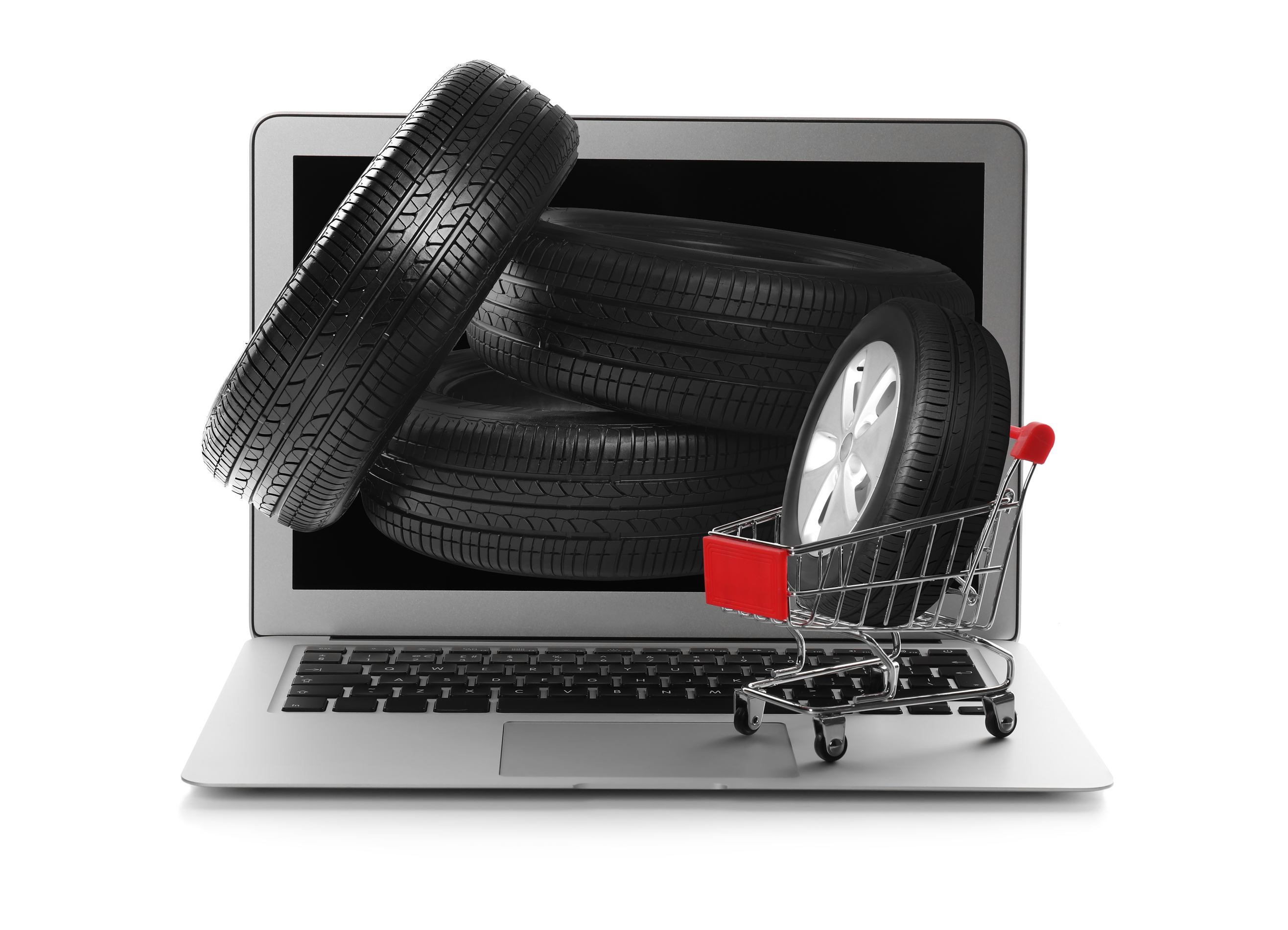Your Shopping Cart
Your cart is empty.
Subtotal ( items)
Instant Rebate Applied:
Promo Code Applied:
Have a Promo Code?
Size:
Item
Item
Selected for:
/ each
Add-Ons
Wireless air pump capable of pumping up to 150 psi with 2000 MAH power bank.



Fully protect your clothes and vehicle interior during transportation of your tires. For Tires up to 31" tall and wheels up to 22".
Per sensor
Add TPMS Sensors
/per sensor
Please confirm the make, year, model and trim of the vehicle you want to purchase for:
How many sensors do you need?
The vehicle you have selected is not compatible with aftermarket TPMS Sensors.
Enter a different vehicle to add TPMS sensors

 Front Tire Size:
Front Tire Size:
 Rear Tire Size:
Rear Tire Size:
 Your Vehicle:
Your Vehicle:
Pros & Cons of Staggered Fitment

Attractive Design

Improved Handling

Improved Cornering
Bumpier Ride
Poor Traction in Snow
How do I find my tire size?



Need help?
 Your Vehicle:
Your Vehicle:
Pros & Cons of Staggered Fitment

Attractive Design

Improved Handling

Improved Cornering
Bumpier Ride
Poor Traction in Snow
How do I find my tire size?



Need help?
Pros & Cons of Staggered Fitment

Attractive Design

Improved Handling

Improved Cornering
Bumpier Ride
Poor Traction in Snow
Need help?
Need help?
How do I know if I have an LT tire?

 Your Vehicle:
Your Vehicle:
Sorry, we could not find any available
wheels for your sizing selections.
Need help?
Should I Rent to Own or Finance My Tires And Wheels?
By Tire Agent Staff
December 21, 2023
(Originally published June 26, 2022)
Rent to own (RTO) is a type of payment plan that allows a buyer to make payments to a seller, and when an agreed-upon minimum has been reached, ownership transfers from the seller to the buyer.
Simply put, RTO is a form of buy-now-pay-later payment plan.
How Does Tire and Rim Lease-to-Own Work?
When you rent to own or lease to own, you receive a product and pay some agreed upon monthly (or weekly) amount, rather than a large amount of upfront cash. At the end up the agreed upon payment period, which can be weeks or months, you own the product.
This may sound the same as financing. And that’s because … it is.
Who offers RTO and LTO packages?
In this section, we'll explain two types of sellers where you'll find rent or lease to own options: (1) brick-and-mortar tire rental places near you and (2) online tire sellers including Tire Agent.
Local tire rental places
Search online for "rent a tire near me" or "places that rent rims near me" and you'll find all kinds of places that may be willing to lease tires and aftermarket wheels. Before you agree to a lease with a local place that rents rims and tires, ask:
- Are the tires and rims brand new? Inspect them closely and note any signs of wear. Read what we have to say about buying used tires.
- What are the terms? Does the seller charge interest? What happens if a payment is missed or late?
- Do they offer early purchase options? In other words, if you decide to complete your purchase before the terms of the agreement end, is there a penalty?
- At the end of the agreement, who owns the tires and/or rims? Does ownership transfer, and will they send you that in writing?
Online tire rental sites
In addition to local tire and rim stores, you'll find online reputable sites that offer to rent a wheel, rent a tire. We can't speak for other online retailers, but we can tell you how it works at Tire Agent.
Shop online for tires and wheels, making sure they fit your vehicle's make, model, year, and size. Add them to your cart, and follow the prompts. When you arrive at the Payment Method, select PayPair to complete the online application.
One application will provide you with access to several payment options. Our current PayPair options are available for you to review before you start the shopping process, and if you have questions about the specific plans, contact the financial institution directly.
If any time this seems confusing ... we have agents standing by to answer questions about Tire Agent payment plans:
How Does Purchase Financing Work?
Financing a vehicle is a common part of the buying process, as most people don’t have tens of thousands of cash dollars to buy a car. Instead, the financial burden is lessened as you put down an initial payment and then agree upon a monthly payment over several years. To borrow the money, you pay a percentage (called interest) to the dealership, bank, or whoever is loaning the money, and they profit from this interest.
An interest rate represents the fee you’re paying to the lender to borrow money. It’s usually represented by a percentage of the total cost of the thing you’re buying. If it’s an annual interest rate, that percentage is a fixed amount based on the principal. For example, if you’re buying a $1,000 set of four tires and your interest rate is 5% over 18 months, you’ll be paying an extra $75 in interest.
Compounded interest will accrue the interest that you’ve paid already. Essentially, you’re paying interest on the interest. Depending on when the interest is compounded, this can either have little to no financial difference from simple annual interest or mean paying many times more than the original principal value. For example, if that same $1,000 set of four tires with a 5% interest rate over 18 months is compounded monthly, you’ll be paying $1,406 extra on top of the $1,000 principal.
In another tire financing model, also known as "same as cash," the balance due is divided into equal parts. For the same $1,000 set of tires, you might pay $200 up front and then divide the remaining $800 over 90 days, making your payments around $266 for three months.
These are very simplified ways of looking at vehicle and tire purchase financing. You should read the fine print on any purchase agreement before agreeing to the terms.
So, you can see why it’s important to pay attention to what financing option you agree on before locking in.
Financing Tires and Wheels
Tires and wheels will usually cost hundreds of dollars up front, which isn’t easy for some people. This may be more than their credit limit or more than the amount of cash they have on hand. Regardless of the reason, lenders know that money is tight and you need the tires, so it’s possible to be paying two, three, and even four times the cash value of a tire. With tires and wheels, a payment period of a year or more will likely mean you’re paying two to three times the cash value of the tire.
Fortunately, payment plans do exist that vary depending on what your credit is. Some financing companies offer a 90-day same as cash deal. If you make a purchase and pay it off in three months, there’s no interest and the total price will be the same as cash. However, if you go beyond 90 days or with a 52-week payment plan, you could end up paying about double the cash price even though your payments will be lower weekly.
Many of Tire Agent’s participating payment plans share this 90-day same as cash offer. Paytomorrow, for example, has a $1 down payment and 90-day same as cash offer. UOwn has a zero down 90-day same as cash offer, and for a small fee you may be able to extend your payments beyond 90 days.
This is more financially realistic and takes a financial burden off you, rather than paying hundreds of dollars up front. Also, 90-days same as cash doesn’t typically require good credit scores. However, keep in mind that if you can’t pay the tires off in 90 days, it can get very expensive.
Ultimately, pay-to-rent plans are good if you don’t have hundreds of dollars up front cash, but you are able to pay the tires off in 90 days or less. The best part is that you don’t have to have great credit to qualify.
If you’re looking to learn more about our tire financing plans, check out our blog on the topic. We have online chat and phone support to answer any questions about the tire buying process. With Tire Agent, shipping is always fast and free to any recommended installer of your choice.
Main Photo 175076488 | Aliia Chazova | Dreamstime.com
Photo 248363208 | Wheels | Chernetskaya | Dreamstime.com
Next Post:
Hydroplaning: What It Is and How to Avoid It

